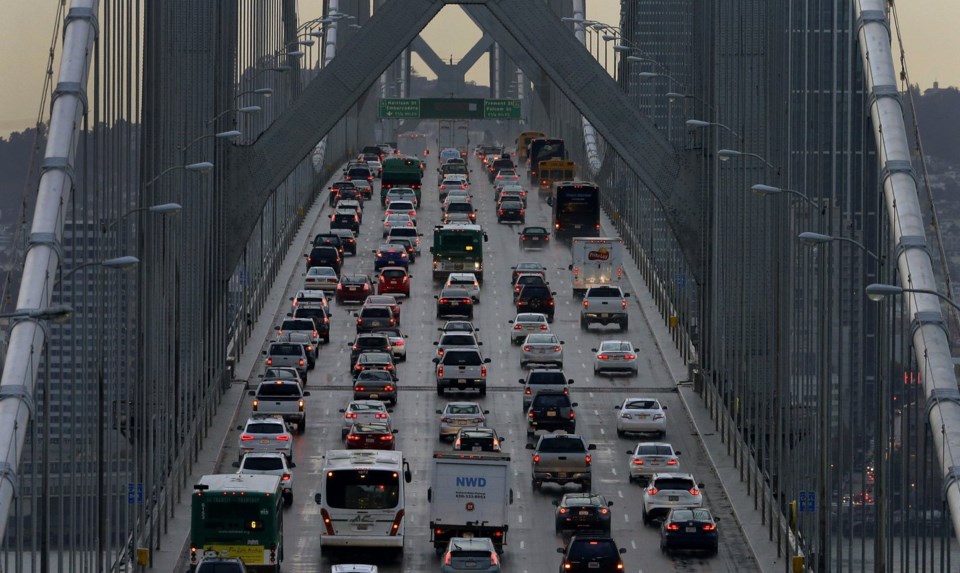SACRAMENTO, Calif. (AP) — The Republican-controlled U.S. House voted Thursday to block California from enforcing first-in-the-nation rules phasing out the sale of new gas-powered cars by 2035.
The move comes a day after the chamber voted to halt California standards to cut tailpipe emissions from medium- and heavy-duty vehicles, as well as curb smog-forming nitrogen oxide pollution from trucks.
“The passage of these resolutions is a victory for Americans who will not be forced into purchasing costly EVs because of California’s unworkable mandates,” House Republicans Brett Guthrie of Kentucky and Morgan Griffith of Virginia, said in a statement. “If not repealed, the California waivers would lead to higher prices for both new and used vehicles, increase our reliance on China, and strain our electric grid.”
California for decades has been given the authority to adopt vehicle emissions standards that are stricter than the federal government's. Democratic Gov. Gavin Newsom in 2020 announced plans to ban the sale of all new gas-powered vehicles in the state by 2035, as part of an aggressive effort to lower emissions from the transportation sector. Plug-in hybrids and used gas cars could still be sold.
State regulators then formalized the rules, some other states announced plans to follow them, and the Biden administration approved the state's waiver to implement them in December, a month before President Donald Trump returned to office.
This week's House votes fell largely along party lines, though some Democrats joined Republicans to advance them. That would be against the advice of the Senate Parliamentarian, who sides with the U.S. General Accountability Office in saying California’s policies are not subject to the review mechanism used by the House.
Republicans used the Congressional Review Act, a law aimed at improving congressional oversight of actions by federal agencies, to try to block the rules. The Trump administration in 2019 revoked California’s ability to enforce its own emissions standards, but Biden later restored the state’s authority.
But the California standards cannot legally be blocked using the Congressional Review Act, the U.S. Government Accountability Office, a nonpartisan congressional watchdog, wrote in a letter to Congress in March.
Newsom said the effort is another signal of Republicans' ideological shift over the decades from an era in which former presidents Richard Nixon and Ronald Reagan signed landmark environmental laws to one in which Trump is pushing for environmental rollbacks on everything from clean air to clean water and climate change.
“Clean air didn’t used to be political," Newsom said in a statement. “Our vehicles program helps clean the air for all Californians, and we’ll continue defending it.”
A spokesperson for the California Air Resources Board, which passed the vehicle emission standards, said the agency “will continue its mission to protect the public health of Californians impacted by harmful air pollution.”
It is unclear what will happen in the Senate. The Senate Parliamentarian in April reaffirmed the GAO’s findings that California’s Clean Air Act waivers are not subject to the Congressional Review Act, according to California Sen. Adam Schiff's office.
“We will fight this latest attack on California’s power to protect its own residents, and I will urge my colleagues in the Senate to recognize the severe implications of proceeding with this violation of states’ rights, as well as the dangerous precedent it would set by flouting the unanimous opinion of Congress’ trusted arbiters," the Democrat said in a statement.
Dan Becker, director of the Center for Biological Diversity’s Safe Climate Transport Campaign, called the use of the Congressional Review Act a “backdoor move” that “shows just how recklessly Republicans behave.”
"Republicans may regret opening this Pandora’s box, inviting attacks on many other non-rules in the future when they’re no longer in charge,” Becker said in a statement.
But the American Petroleum Institute and the American Fuel and Petrochemical Manufacturers applauded Thursday's vote, calling it a “huge win for U.S. consumers."
"California’s unlawful ban should never have been authorized, and Governor Newsom should never have been allowed to seize this much control over the American vehicle market,” Mike Sommers, the institute's president and CEO, and Chet Thompson, the manufacturers group's president and CEO, said in a joint statement.
___
Associated Press writers Lisa Mascaro in Washington and Trân Nguyễn in Sacramento contributed to this report.
___
Austin is a corps member for The Associated Press/Report for America Statehouse News Initiative. Report for America is a nonprofit national service program that places journalists in local newsrooms to report on undercovered issues. Follow Austin on X: @sophieadanna
Sophie Austin, The Associated Press



